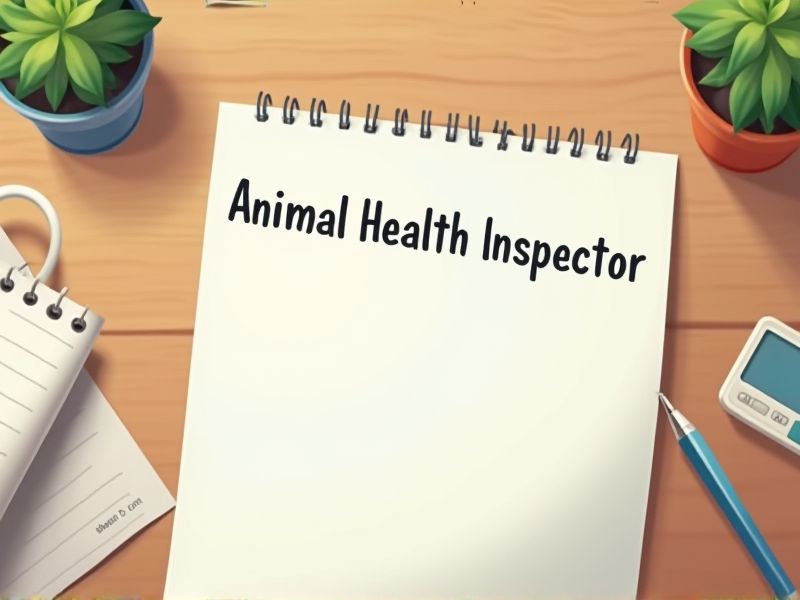
Animal Health Inspectors play a critical role in ensuring the wellbeing of animals and safeguarding public health. Proper certifications validate their expertise in handling complex animal health issues and understanding disease control measures. These certifications also ensure compliance with legal standards and ethical guidelines in animal care practices. Here are some important certifications needed for an Animal Health Inspector.
USDA-APHIS Certified Veterinary Inspector
The USDA-APHIS Certified Veterinary Inspector is needed for Animal Health Inspector roles to ensure compliance with federal regulations regarding animal health and welfare. Their certification provides the necessary expertise to identify and manage potential outbreaks of animal diseases, which helps prevent economic losses in agriculture. By conducting inspections and overseeing animal transport, they help maintain public safety and confidence in food sources. Their role also supports international trade by ensuring animals meet the health standards required by importing countries.
National Animal Health Inspection Program Certification
The National Animal Health Inspection Program (NAHIP) Certification is needed for Animal Health Inspectors to ensure they have the necessary skills to detect and manage infectious diseases. Certification standardizes the competencies required to safeguard animal populations, which reduces the likelihood of disease outbreaks. NAHIP Certification enhances the credibility of inspectors, thereby increasing trust among stakeholders in the agricultural and animal husbandry sectors. Certification helps maintain compliance with national and international health standards, facilitating smoother trade and transportation of livestock.
Certified Veterinary Technician (CVT)
A Certified Veterinary Technician possesses essential clinical skills, ensuring accurate health assessments during inspections. Regulatory compliance requires inspectors to have technical knowledge, which CVTs provide through their comprehensive training. Animal welfare standards are met efficiently when CVTs contribute their expertise in identifying health risks. Public health safety improves because CVTs can detect zoonotic diseases early during inspections.
Animal Welfare and Ethics Certification
Animal Welfare and Ethics Certification equips Animal Health Inspectors with the necessary understanding of humane treatment standards, which helps ensure that animals are treated humanely and ethical conduct is maintained during inspections. It enhances inspectors' ability to identify and address instances of animal cruelty and neglect, fostering accountability among animal-related businesses and owners. The certification elevates the credibility and public trust in inspectors, as it demonstrates a commitment to ethical and compassionate animal care standards. Regulatory compliance is facilitated as inspectors are better informed about current laws, leading to more effective enforcement of animal welfare policies.
Food Safety Audit Certification
Food safety audit certification for an Animal Health Inspector is essential to ensure the consistent adherence to health and safety standards, which directly impacts the well-being of both animals and humans. This certification equips inspectors with the necessary skills to identify and mitigate contamination risks in animal products. Achieving certification enhances trust in the food supply chain, as consumers and stakeholders rely on verified quality control measures to protect public health. The certification process also reinforces regulatory compliance, helping facilities avoid legal penalties and maintain operational integrity.
HACCP Certification
HACCP Certification is essential for Animal Health Inspectors because it ensures systematic identification and management of food safety risks, crucial for preventing contamination in animal-derived food products. This certification signifies that the inspector is adept in implementing regulatory safety measures, which is critical for public health protection. Knowledge gained from HACCP processes empowers inspectors to contribute to safer supply chains, minimizing the risk of disease transmission. The certification also aligns with international standards, facilitating trade compliance and enhancing consumer confidence in animal products.
Good Manufacturing Practices (GMP) Certification
Good Manufacturing Practices (GMP) Certification ensures that animal health inspectors have a standardized framework for evaluating the quality and safety of manufacturing processes. It reduces the risk of contamination or mislabeling that can potentially harm animals or compromise public health. Holding a GMP certification demonstrates compliance with regulatory standards, fostering trust among consumers and stakeholders in the animal health sector. It enhances the inspector's credibility and competency in assessing facilities and practices related to animal healthcare products.
Biosecurity Fundamentals Certification
Animal Health Inspectors need the Biosecurity Fundamentals Certification to effectively prevent disease outbreaks, which can devastate livestock populations. The certification ensures inspectors understand the protocols required to mitigate the spread of infectious diseases among animals. Without this specialized knowledge, inspectors may inadvertently contribute to the transmission of pathogens, harming both animal welfare and the agricultural economy. As global trade increases, so does the risk of cross-border disease transmission, making biosecurity training essential for inspectors to manage these risks effectively.
OSHA Occupational Health and Safety Certification
OSHA Occupational Health and Safety Certification ensures that Animal Health Inspectors understand workplace safety standards, reducing their risk of injury while handling animals or hazardous materials. This certification equips inspectors with the knowledge to identify and mitigate potential hazards, enhancing the overall safety of their work environment. By understanding OSHA regulations, inspectors can create safer conditions for themselves and their colleagues, which is crucial in environments with live animals and biological agents. The certification instills confidence in the inspectors, encouraging best practices that promote a safer, more efficient inspection process.
Emergency Animal Disease Preparedness Certification
Emergency Animal Disease Preparedness Certification is needed for Animal Health Inspectors because it ensures they are equipped with the knowledge to identify and respond to disease outbreaks promptly. The certification enhances inspectors' ability to implement biosecurity measures, reducing the risk of disease spread. It guarantees that inspectors can effectively collaborate with other agencies and stakeholders during emergencies, ensuring a coordinated response. This certification promotes public confidence in animal health systems by demonstrating a commitment to professional standards and effective disease management.
Summary
When you become an Animal Health Inspector with relevant certifications, your credibility and authority in the field significantly increase. This enhanced professional status can lead to improved enforcement of health standards in animal facilities. Your expertise ensures that facilities comply with regulations, reducing the risk of disease outbreaks. You also contribute to the welfare of animals, gaining the trust of both the industry and the public.
